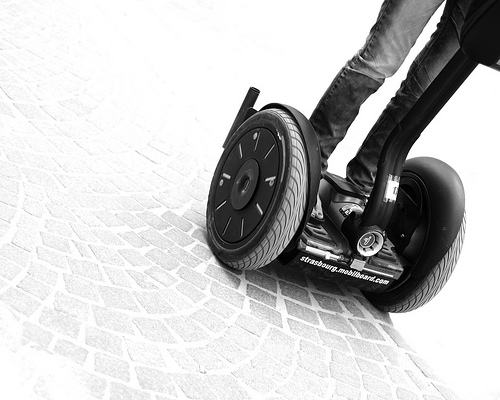ACT set to overturn Segway ban

The use of the Segway personal mobility device is still outlawed in most Australian states and territories, but that could soon change, as the Australian Capital Territory kicks off an inquiry into the vehicles.

(Segway image by Tom Nelson, CC2.0)
The Segway is a two-wheeled, scooter-like personal mobility device that self-balances using a gyroscope, with a maximum speed of approximately 20km/h. They are currently outlawed for use in public areas by most state governments and local municipalities, including in the ACT.
The ACT's Department of Justice and Community Safety, however, may look to revise these rules following a consultation process with the public that has kicked off this month.
Segways are banned in the ACT due to the fact that they don't fit the requirements to be classed as a moped, and, even if they did, they would require the user to wear a motorcycle helmet, pay for third-party insurance and register the vehicle.
Using a Segway on a public path or roadway would see the user fined in excess of $2200, while running the risk of having a defect notice slapped on the vehicle.
Concerns have also been raised for pedestrian safety and the possibility of inconveniencing users when parking the vehicles around the community.
The ACT Department of Justice and Community Safety is now asking concerned individuals to respond to a battery of questions on the use of the Segway in public areas.
Questions include the need for training and safety gear when using Segways; how the roadway and pedestrian paths can be shared between various users; whether the Segway should be exempt from Australian design-standard specifications that see it disqualified from legal use; and whether any groups should be precluded from using the device (ie, an age limit or other restrictions).
The government is also asking the public to decide whether Segway users ought to register the vehicle with the relevant authorities.
The discussion paper (PDF) concludes with the assertion that there is no evidence to suggest that the use of Segways by private or commercial entities risks the safety of the public:
Segways are used both privately and commercially in other countries. While there are road-safety risks associated with the use of any vehicle on roads and road-related areas, there is no evidence to suggest that Segway use exposes users or others to a higher degree of risk than vehicles already permitted to be used in the ACT, including bicycles. The benefits in regard to tourism, local economic growth, social interaction and increased transportation options remain largely unknown and under researched.
It is reasonable to consider their use in the ACT, despite the prohibition of Segways on roads and road-related areas in other Australian jurisdictions.
Several businesses and individuals looking to use Segways for tours and recreational activities, particularly around Lake Burley Griffin, prompted the review by asking territory authorities for exemptions to the Segway ban.
The review is open for submissions through to 13 April.